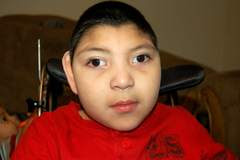
If doctors had treated the infection that developed shortly after Christian Arroyo was born, his whole life would have been different, a federal appeals court has ruled, agreeing with his illegal alien parents. Notwithstanding that his parents couldn't speak English to give the hospital any past medical history.
Christian developed a fairly common neonatal blood infection that doctors and nurses at a federally funded clinic left untreated more than 12 hours — leading to irreversible brain damage — according to his parents’ lawsuit.
They won the medical malpractice suit against the Erie Family Health Center last year, when a federal judge ruled doctors were negligent in their care of Christian and awarded the now 8-year-old quadriplegic $29.1 million.
The government appealed, but the U.S. Court of Appeals in Chicago upheld the ruling this past week.
“At one point or another, he pretty much had almost every sign of the infection. At one point, the baby was not even able to see, which was a really bad sign,” said Christian’s attorney, Patrick Salvi II. “This was malpractice, there’s no question about it.”
The government had appealed on grounds that the suit was untimely because Arroyo’s parents waited two years to file it, but the appeals court judges rejected that argument.
Because the doctors never informed the Arroyos that the brain damage could have been avoided with the use of antibiotics, the Arroyos were not at fault, their attorney said.
“(The doctors) made no mention of the possibility of antibiotics,” Salvi said. “If you don’t want to tell patients you could have done (something) to help them, you can’t come back and say they should have known to sue.”
He said when Christian was born in 2003, the Arroyos didn’t realize the doctors at Erie had done anything wrong. But when their second son was born a year later and was immediately treated with the antibiotics, the parents became suspicious, Salvi said.
Christian, a spastic quadriplegic with cerebral palsy, is a happy second grader who loves music and his family but requires a lot of care, his father, Carlos, 30, said.
“It’s hard because there’s a limit to what we can do with him,” he said. “I’m glad (with the ruling) ... because my son is going to get all the care he needs for the rest of his life, and that’s all we care about.”